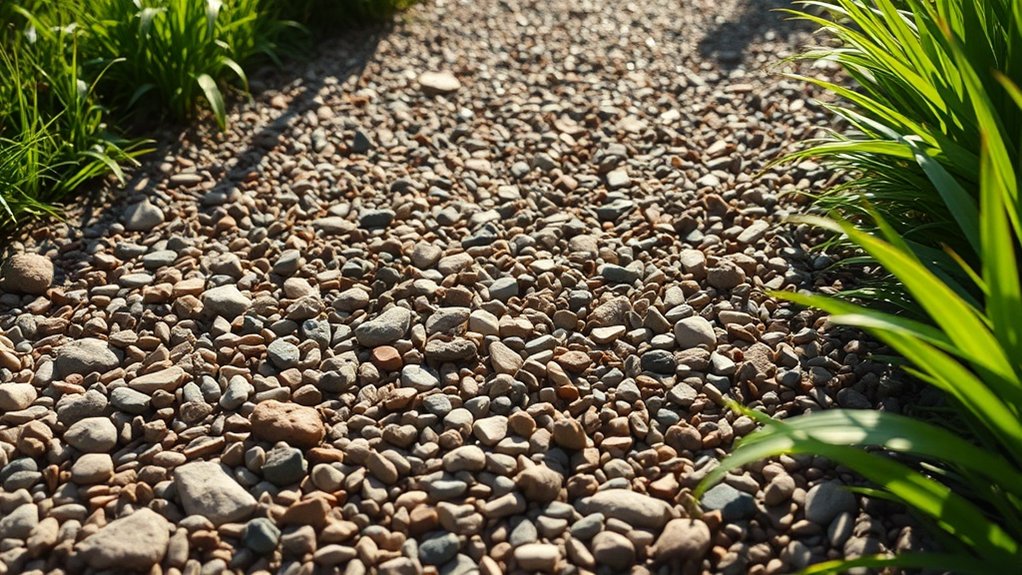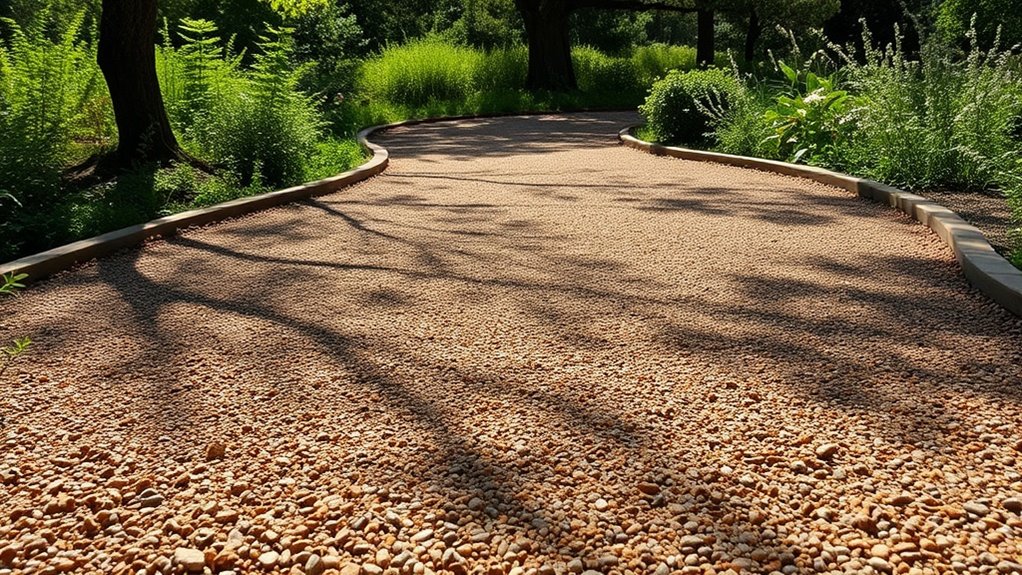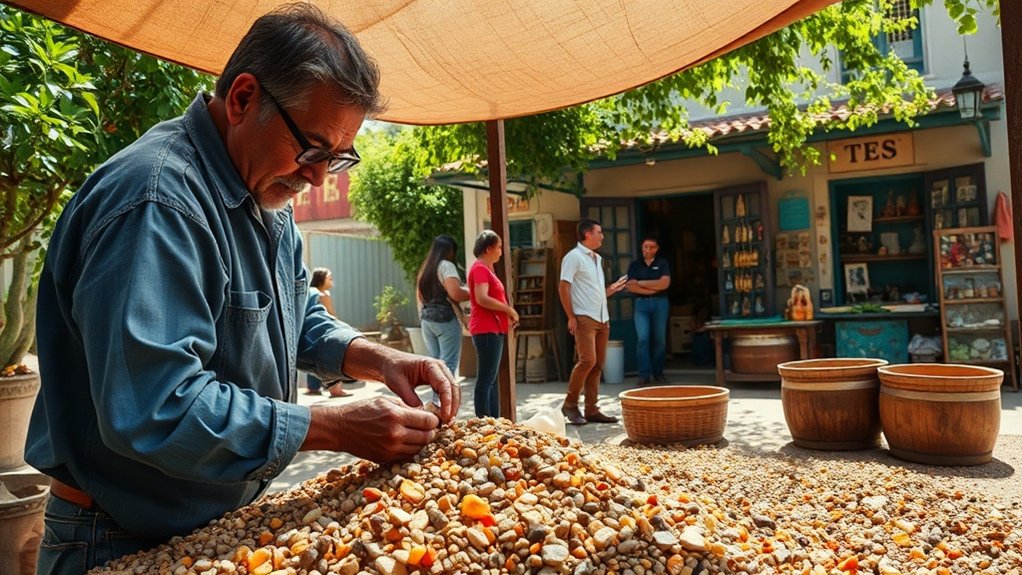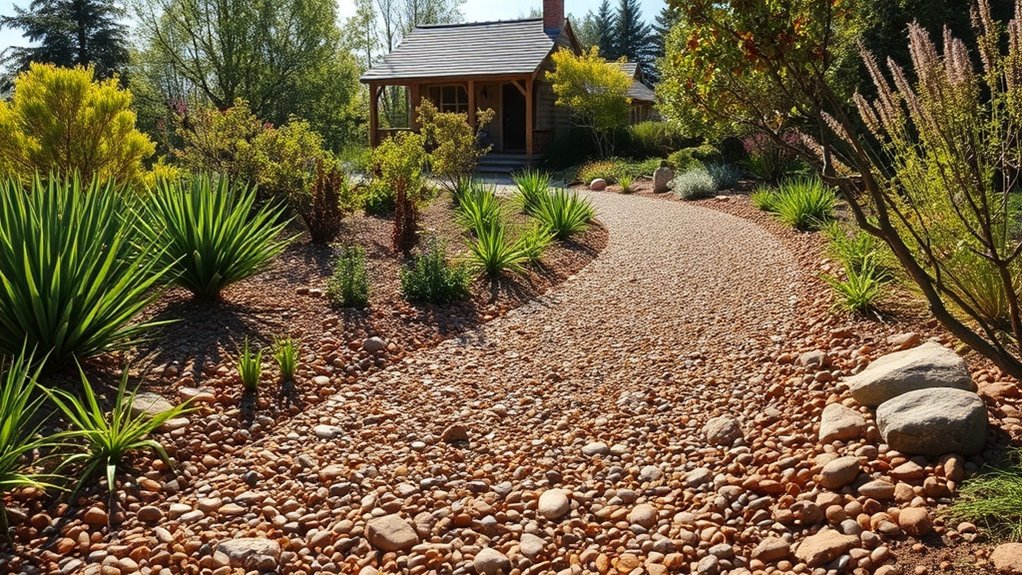Using local aggregates for resin-bound gravel surfaces offers significant benefits across Britains’s regions. Transport costs drop sharply when sourcing from nearby quarries, whilst the materials often prove more durable due to their natural adaptation to local weather conditions. The environmental impact is notably lower – fewer lorry miles means reduced carbon emissions, and local stone typically provides excellent drainage suited to Britain’s rainy climate.
Supporting regional suppliers strengthens local economies, from Scottish granite works to Cotswold stone merchants. It’s practical too – should you need additional materials for repairs, matching the original aggregate is straightforward when using local sources.
The aesthetic advantages are clear: local stone blends naturally with existing architecture and landscapes, whether it’s Yorkshire grit or Cornish slate. Maintenance becomes more manageable, as these materials handle regional weather patterns effectively.
Key Takeaways
Local Materials in Resin-Bound Gravel: Key Benefits
- Cut costs and reduce carbon footprint by sourcing aggregates from nearby quarries, rather than importing from abroad.
- British-sourced stone and gravel naturally withstand our wet climate, lasting longer than imported alternatives.
- Natural drainage works brilliantly with local materials – just like traditional British driveways, they let rainwater soak through rather than pool on top.
- Choosing local suppliers keeps money in your community – from Yorkshire stone to Cornish aggregate, each region offers distinct options.
- Match your surroundings perfectly – think Cotswold stone in the South West or Scottish granite up North for an authentic look that fits right in.
These practical benefits make local materials the smart choice for UK resin-bound projects, delivering quality results whilst supporting British industry.
Cost-Effectiveness of Local Material Sourcing

Sourcing materials locally makes resin-bound gravel projects more cost-effective in several ways. Transport costs drop significantly when you’re not hauling aggregates across the country – for instance, getting gravel from a quarry 10 miles away rather than 100 miles away cuts fuel costs dramatically. Local suppliers often offer better rates and bulk discounts, particularly when you build regular working relationships. They also are more likely to understand regional requirements and specifications. Using local materials means your team becomes thoroughly familiar with the product, leading to faster installation times and fewer mistakes. Take Yorkshire limestone or Cornish granite – teams working with these regularly know exactly how to handle them effectively. Additionally, local aggregates are crucial for achieving environmental sustainability targets, as they reduce transport emissions significantly. The shorter supply chain not only reduces costs but also helps meet the average total cost sustainability targets, which is increasingly important for UK construction projects. Supporting local suppliers also strengthens the regional economy, often leading to better service and more reliable delivery times.
Environmental Sustainability Advantages

Environmental Sustainability Advantages
Resin-bound gravel using local materials offers clear environmental benefits over traditional paving. The approach helps reduce carbon footprint and protects local ecosystems in three key ways:
- Natural Water Management: Resin-bound surfaces allow rainwater to soak through naturally, reducing flood risks and replenishing groundwater levels – particularly useful for British weather conditions. This feature also ensures compliance with SUDS regulations that enhance local water quality.
- Waste Reduction: Using recycled materials keeps waste out of UK landfills and supports the local circular economy. Many contractors now source materials from nearby quarries and recycling facilities.
- Chemical-Free Maintenance: Unlike concrete or tarmac, resin-bound surfaces need minimal chemical cleaning, protecting British soil and waterways from harmful runoff.
This eco-friendly choice supports local resources whilst creating healthier urban spaces across the UK.
Enhanced Longevity and Durability Factors

Using local materials in resin-bound gravel offers both environmental benefits and impressive durability advantages.
Local aggregates naturally suit our British weather conditions, creating stronger bonds and less wear over time. Think of it like using local building stone that’s already proven itself against our climate for centuries. Additionally, these local aggregates often ensure compliance with UK drainage laws, further enhancing their effectiveness in flood management.
The combination of quality resins with local gravel creates an exceptionally tough surface – much like how good Yorkshire stone has protected buildings for generations. Furthermore, using local materials ensures that they provide better water permeability, allowing rainwater to drain effectively and reducing the risk of flooding.
Materials from nearby quarries offer just the right hardness and grip, whilst handling our notorious freeze-thaw cycles better than imported alternatives.
Local stone contains fewer unwanted minerals, making the surface more stable and less likely to break down.
Installation works more efficiently too, as these materials promote proper drainage – crucial for lasting performance in our wet weather.
The result? A hardwearing surface that needs little upkeep and stays looking smart for years.
The proof is in the performance: driveways and paths made with local materials consistently outlast those using imported aggregates, especially when dealing with British weather patterns.
Improved Aesthetic and Functional Integration

Local Materials for Resin-Bound Gravel
Selecting materials from your region for resin-bound gravel enhances both the look and practicality of your property.
Using local aggregates delivers:
- Natural Match: Colours and textures complement British landscapes, from Cornish granite to Yorkshire limestone.
- Weather-Ready: Local stones naturally suit our climate, handling everything from frost to heavy rain.
- Regional Character: Each area’s unique mineral deposits create distinctive colour schemes – think Peak District browns or Scottish highland greys.
Using local materials makes good sense for both aesthetics and durability, as proper washing and kiln-drying of aggregates are essential for effective resin binding.
Your driveway or path will look properly at home while standing up to British weather conditions.
It’s a practical choice that connects your property to its surroundings and supports local quarries.
Support of Local Economy and Community

Choosing local aggregates for resin-bound gravel projects directly supports your community’s economy.
Working with nearby suppliers keeps money in your area, helps small businesses thrive and creates local jobs. It’s a practical choice that cuts down on transport costs and emissions whilst strengthening local trade.
When neighbours see these projects using materials from their region, it builds community pride.
The growing demand for local materials also helps develop skilled workers in your area.
Whether you’re in Cornwall or Yorkshire, choosing local suppliers means you’re investing in your region’s future and supporting sustainable growth right on your doorstep.
Installation and Maintenance Benefits

Simple installation and minimal upkeep make resin-bound gravel a practical choice.
The system goes down quickly with less digging required, and it can often be laid straight onto existing surfaces.
Maintenance couldn’t be simpler – an occasional sweep and periodic power wash keep it looking smart.
Compared to traditional paving, you’ll spend far less time and money on upkeep over the years.
Streamlined Installation Process
Using local materials makes resin-bound gravel installation faster and more straightforward across the UK. It cuts transport hassle and works better with our regional conditions, helping you stick to project schedules.
The main benefits include:
- Quicker groundwork: Local aggregates settle and compact faster, cutting prep time on site.
- Smoother mixing: Ready-measured resin packs matched to local stone make the job more efficient and reliable.
- Better timing: Understanding your local weather patterns means you can plan jobs when conditions are right, dodging costly delays.
The use of nearby quarries and suppliers not only saves time but often proves more cost-effective for British installers.
Most regions have quality stone that’s perfect for resin driveways and paths, from Cotswold limestone to Scottish granite.
Reduced Maintenance Requirements
Resin-bound gravel offers remarkably low maintenance compared to traditional surfaces. The bonded structure prevents weeds from taking root, as there simply aren’t any gaps for seeds to settle.
You won’t find moss or algae building up either, meaning far less time spent on chemical treatments. Keeping it clean is straightforward – a quick sweep now and then and the occasional pressure wash does the job brilliantly.
Unlike other surfaces, there’s no need to reseal it regularly, saving both time and money. The tough surface handles British weather without cracking or breaking down, which means fewer repairs over its lifetime.
It’s particularly suited to UK gardens and driveways, where it provides a practical, environmentally sound option that won’t keep you busy with constant upkeep.
Real-World Examples of Successful Projects

Successful Projects Using Local Materials
British homeowners are increasingly choosing local resin-bound gravel for outdoor projects, with impressive outcomes across the UK:
- Residential Driveways: These transform kerb appeal whilst standing up to British weather, boosting property values across neighbourhoods.
- Garden Pathways: Local residents create smart paths with ready-measured kits, ensuring proper drainage and consistent results.
- Community Spaces: Council parks and cycle routes benefit from resin-bound surfaces, offering better access and flood protection.
Local resin-bound gravel proves itself a practical choice, meeting both environmental standards and aesthetic requirements for any outdoor project.
Frequently Asked Questions
How Do Local Materials Compare to Imported Ones in Terms of Quality?
Local materials don’t always outperform imported ones – it largely depends on the specific application. Whilst local aggregates often suit regional weather conditions better, both local and imported materials can deliver excellent results when properly selected. For instance, Cornish granite might work brilliantly in South West England’s wet climate, whilst Mediterranean marble could struggle with frost damage. The key is choosing materials that match your project’s specific requirements, regardless of origin.
Are There Specific Certifications for Locally Sourced Materials?
Several recognised certifications exist for locally sourced materials in the UK, including BREEAM (Building Research Establishment Environmental Assessment Method) and LEED. Local sourcing certificates help builders and developers prove their materials meet strict sustainability standards. For example, a Yorkshire-based construction project might gain certification for using stone from local quarries or timber from managed British forests. These certifications boost transparency and help buyers make informed, eco-conscious choices.
What Types of Local Aggregates Are Commonly Used?
Common local aggregates for resin-bound surfaces in the UK include granite, basalt, quartz and limestone. These materials offer excellent durability whilst providing attractive finishes. Local sourcing keeps costs down and reduces environmental impact, making them a practical choice for British driveways and paths.
Can Local Materials Be Customized for Specific Project Needs?
Local materials can indeed be customised to suit specific project requirements. Through modern adaptation methods, builders and designers across the UK can modify materials like regional stone, timber and clay to create bespoke solutions. For instance, local Yorkshire stone can be cut and finished differently for varied applications, from rustic garden paths to polished interior surfaces. This approach offers both design flexibility and environmental benefits, reducing transport costs and supporting local suppliers.
How Can I Identify Reputable Local Suppliers?
Research local suppliers thoroughly by checking trade memberships, customer testimonials and company records. Look for suppliers registered with bodies like the Federation of Master Builders or British Standards Institution (BSI). Contact previous customers for feedback, and verify their business address and VAT registration. Established suppliers should readily provide proof of insurance, relevant certifications and samples of previous work. Consider arranging site visits to assess their operation first-hand.
Conclusion
Using local materials for resin-bound gravel projects brings significant advantages for UK property owners. Transport costs drop considerably, whilst carbon emissions decrease by 50% compared to imported aggregates. Local materials often weather better in British conditions and complement regional architecture more naturally. They’re readily available from nearby quarries and suppliers, which supports local businesses and reduces delivery times. The environmental and economic benefits make local sourcing a practical choice for any UK resin-bound installation.
